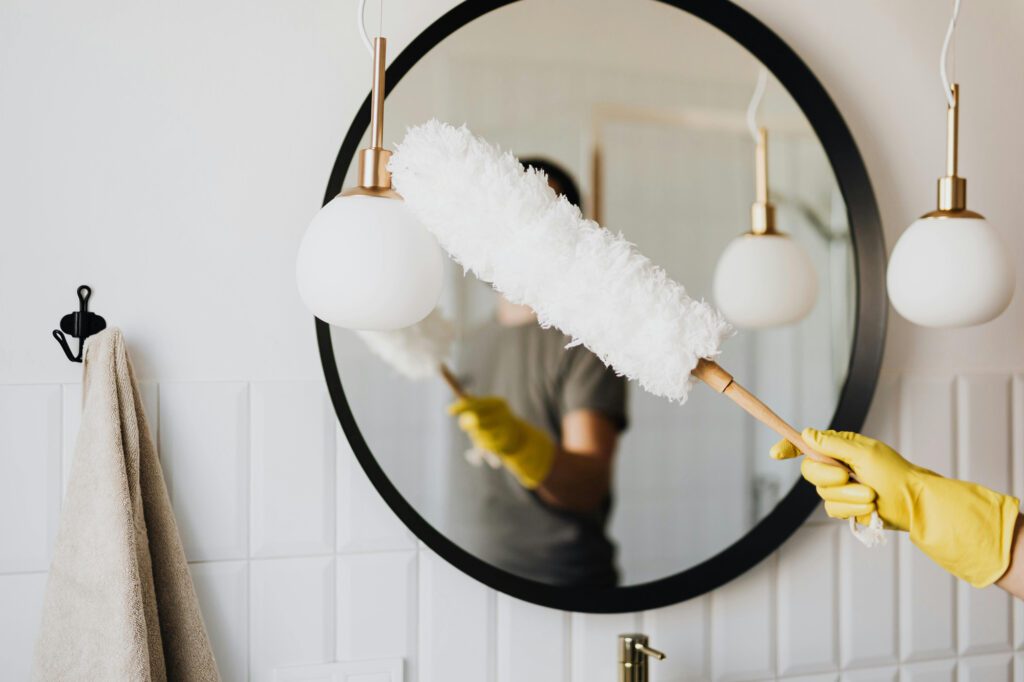Keeping clean is big business. So big, in fact, that the cleaning services market was valued at over $375 billion in 2022. By 2030, it could reach over $633 billion. That’s a compound annual growth rate (CAGR) of 6.8%. If you’ve got an entrepreneurial spirit, starting a cleaning business may be something you’ve considered.
Cleaning businesses enjoy steady demand, plenty of flexibility, and low startup costs that won’t break the bank. In addition, starting this type of business is fairly straightforward. Thinking about taking the plunge? Let’s dive into everything you need to know about how to start a cleaning business.
Why Start a Cleaning Business?
There are many reasons why starting a cleaning business has such strong potential.
First, cleaning services are becoming increasingly popular not only in the commercial sector but in the residential sector, too. In 2022, it’s estimated that 10% of all U.S. households used a cleaning service for their home. By 2024, the U.S. Department of Commerce expects that up to 80% of two-income households will be using an outside cleaning service to keep their homes tidy.
What’s more, the barriers to entry for this type of business are fairly low. You don’t need any special education or certifications to start a cleaning business, and experience is not required. Initial startup costs are also relatively minimal compared to other types of businesses; it’s estimated you’ll need to spend around $500 on equipment to start, with additional costs for marketing, licensing, and insurance, depending on what you need.
Running a cleaning business is also flexible. You have full freedom to set your own hours, schedule, and flat or hourly rates, working in a way that best suits you. Additionally, you can set your own pace and choose your work environment and clientele so you’re not overexerting yourself with physical labor. For example, maybe you’re only interested in booking routine residential cleanings rather than heavy-duty commercial space cleaning.
How to Start a Cleaning Business in 7 Steps
- Choose a Business Structure
- Insure and License Your Business
- Pick a Specialty or Niche
- Find Funding
- Stock Up on Supplies and Equipment
- Set Your Rates
- Get the Word Out
1. Choose a Business Structure
In order to establish any successful—and professional—business, you’ll need to carefully consider which business structure is best for your circumstances. Your business structure will have a significant impact on the legal and financial aspects of your cleaning business, and if you’re unsure how to decide, you should seek counsel from a business attorney or trusted advisor.
Of the different business structures, these are the four most popular:
- Sole proprietorship: This is the simplest and most common structure for small businesses in general. As a sole proprietor, you have complete control over all aspects of your business, but that also means you’re personally liable for any debts or legal liabilities your business incurs.
- Partnership: In a general partnership, all partners share equal responsibility for the business’s debts and liabilities. A limited partnership allows for a division of roles and responsibilities, with some partners having limited liability.
- Corporation: Forming a corporation creates a separate legal entity that’s distinct from its owners. Shareholders own the corporation, which is managed by a board of directors. Corporations offer limited liability protection to shareholders, meaning their personal assets are generally protected from business debts and liabilities. However, corporations are subject to more complex regulations and formalities like holding regular meetings and keeping detailed financial records.
- Limited liability company (LLC): An LLC combines the liability protection of a corporation with the flexibility and simplicity of a partnership. As an LLC owner, you are not personally liable for the company’s debts or legal obligations. This structure also offers flexibility in management and taxation, letting you pick whether you want to be taxed as a sole proprietorship, partnership, S corporation, or C corporation.
2. Insure and License Your Business
When you start a cleaning business, certain licenses and permits may be required. The specific licenses will depend on where you live and operate, but commonly, at least a business license is necessary. Contact your local government offices, such as the city or county clerk’s office, to ask about what kinds of licenses are required for your area. They will guide you through the application process and provide you with all the necessary information to obtain the licenses.
You also need to consider insurance options for your new business, which can be one of the hidden costs of freelancing. Insurance provides necessary protection against potential property damage and liability claims. Since you’ll be spending so much time in other people’s homes and businesses, there will always be a risk of third-party injuries (ie; someone slipping on a wet floor) or property damage (ie; damaging the surface of a wooden tabletop). Liability insurance protects you against potential lawsuits from damages or injuries that may occur while you’re on a job.
It’s not just liability insurance you need to think about: If you’re hiring staff for your cleaning business, you could also consider a janitorial bond, which guarantees that a client will be reimbursed if one of your workers steals from them. The appropriate insurance coverage will safeguard your business from any unfortunate circumstances and mishaps.

3. Pick a Specialty or Niche
When you start a cleaning business, you’ll want to pick a specialty that helps set you apart from your competition. It should also be something you’re comfortable with and have the right expertise and equipment for. By focusing on a specific type of cleaning, you can attract clients who are looking for that specialized service.
The two main routes you can choose from include a consumer cleaning business and a commercial cleaning business. Consumer cleaning caters to individuals and households. This could mean routine housekeeping or deep cleaning services. Consumer cleaning lets you tailor your services to meet the needs of the homeowner.
On the other hand, commercial cleaning caters to businesses and organizations. This can include office buildings, restaurants, stores, and more. Commercial cleaning services tend to involve larger projects and plenty of room for further specialization (ie; medical office cleaning). By focusing on a specific area, you can establish yourself as the go-to expert in your field and attract clients who value a more specialized service.
Some additional cleaning niches to consider include:
- Move-in/move-out cleaning: Deep cleaning services for rental properties, apartments, or homes before or after tenants move in or out.
- Post-construction cleaning: Offering cleaning services for newly constructed or renovated buildings to remove debris, dust, and construction materials.
- Specialized surface cleaning: Focusing on specific surfaces like carpets, upholstery, windows, or floors, using specialized equipment, cleaning solutions, and techniques.
- Green cleaning: Providing eco-friendly cleaning services using environmentally friendly products and practices.
- Pool cleaning: Maintaining and restoring the cleanliness, safety, and functionality of residential or commercial swimming pools.
- Hoarding cleanup: Offering compassionate and discreet cleaning services for hoarder homes, addressing clutter, sanitation, and organization.
- Disaster restoration: Providing cleanup and restoration services after natural disasters, fires, floods, or other emergencies.
- Healthcare facility cleaning: Specializing in cleaning medical offices, clinics, hospitals, and other healthcare facilities to meet strict sanitation standards.
- Industrial cleaning: Offering cleaning services for factories, warehouses, manufacturing facilities, and industrial sites, including equipment cleaning and degreasing.
4. Find Funding
Starting a cleaning business doesn’t require a huge financial investment. Depending on what you need (equipment, supplies, marketing, etc.), you can likely get started for somewhere between a few hundred and a few thousand dollars. To save up for this initial investment, there are a few things you can do.
One easy way to bring in quick money is to leverage your existing assets or skills. Think about selling some of your unused or unwanted stuff, or taking on freelance or gig work in your spare time. Additionally, you could start offering your cleaning services on a part-time basis while continuing to work another job, using the earnings to fund the growth of your cleaning business gradually.
There’s also financing. You can explore options like small business loans, lines of credit, or even crowdfunding platforms. Many banks offer small business loans specifically tailored to entrepreneurs looking to start or expand their ventures.
5. Stock Up on Supplies and Equipment
In order to run an efficient and effective cleaning business, you’re going to need supplies.
Start by making sure that you have the appropriate attire, like an apron and gloves, to protect yourself and your clothing while you work. A caddy or cart can also be useful to hold all of your supplies and transport them easily from location to location.
Next, invest in a reliable vacuum cleaner; ideally one that’s high-powered and easily portable. (Consider bringing a long extension cord, too, so you have easy access to power.) A mop, broom, scrubbing brushes, and telescopic duster are all useful for tackling floors, walls, and other surfaces. Don’t forget the small stuff: Rags, paper towels, and sponges are useful for counters, bathtubs, appliances, and other small areas where dirt and grime accumulate.
Finally, having a broad variety of cleaning products on hand is essential. This can include all-purpose cleaners, soap, furniture polish, window cleaners, and disinfectants to remove dirt and germs. Don’t forget to stock up on garbage bags to get rid of the trash.

6. Set Your Rates
You’ll need to be strategic in setting your rates to ensure that you make a profit. There are several factors you can consider when determining your pricing structure. First, decide whether you want to charge a flat rate or an hourly rate. Then, think about the cost of doing business. Things like cleaning supplies, equipment maintenance, transportation, insurance, and payments to any employees all cost money. It’s important that your rates cover all these expenses while leaving room for profit.
You’ll also want to ensure that your prices are competitive with the market. Look at what your competitors are charging for similar cleaning services in your area. This research can also help you attract potential clients and find ways to differentiate your business from the others. What services are your competitors lacking? Look for unique value proposition opportunities for your target market.
Finally, your flat or hourly rates should reflect the value you provide. Clients are willing to pay more if they feel your services are of high quality and that you consistently deliver exceptional results. If you want to charge higher rates, focus on highlighting your expertise, offering excellent customer service, and showcasing positive testimonials to help position your cleaning business as a reliable and reputable choice.
7. Get the Word Out
Marketing can make or break your business. It’s a necessary tactic to bring awareness to what you offer, attract new customers, and drive sales. Without a marketing plan, even the best products and services can go unnoticed.
Marketing can look like many different things, some of which are free, and some of which come at a cost. The good news is there are many options to explore regardless of your budget or experience level.
Free Marketing Strategies
- Social media: Use platforms like Facebook, Instagram, TikTok, and LinkedIn to show off before-and-after photos of your cleaning services. These platforms also allow you to engage with potential customers and build a community.
- Email marketing: Build an email newsletter list through your website or social media channels. Consider offering signup incentives like an exclusive discount for those who opt in.
- Create a blog: SEO marketing goes a long way in bringing organic traffic to your website. Blogging is a great way to achieve this. Consider writing blog posts about cleaning tips, household maintenance, and cleaning industry news. This will help establish you as an expert in the space, boosting your credibility.
- Network: Attend community events, trade shows, or other professional get-togethers to connect with other people in your industry. See if you can build partnerships with local real estate agents and property managers to secure new business.
- Create a referral program: Let your happy customers do some of the legwork for you. Offer referral-based incentives or discounts to your existing clients for recommending your services to others.
Paid Marketing Strategies
- Targeted ads: You can invest in targeted online advertising campaigns through platforms like Google Ads or Facebook Ads. This will help you reach potential customers based on their demographics, interests, and location.
- Sponsor a local event: Are there any notable events happening in your community? Consider sponsoring them to increase your brand visibility and establish your ties to the area.
- Hand out flyers: Print and distribute flyers, brochures, or direct mail ads in neighborhoods or businesses where your target audience resides.
- Use an online directory service: There’s no cost to list your business on online directory services like Thumbtack or Angi, but you may have to pay for access to bookings and leads.
Pros and Cons of Starting a Cleaning Business
Pros of Starting a Cleaning Business
There are many upsides to starting a cleaning business. Some of the biggest pros include:
- Low startup costs: Starting a cleaning business has relatively low startup costs compared to other types of businesses. You can get started with minimal upfront investment in basic cleaning supplies and equipment. It’s an accessible business option for those with limited funds.
- High demand: Cleaning is an essential service that’s in constant demand, regardless of economic conditions. Whether it’s residential homes, commercial offices, or industrial facilities, there is always a need for professional cleaners.
- Scalability: Cleaning businesses have a lot of potential for scalability as you take on more clients and expand your services. As you grow, you can serve larger markets or offer more specialized cleaning services that fetch a higher premium.
- Low overhead: Many other types of businesses require expensive overhead costs like inventory or rental space. A cleaning business can, instead, be operated from home at minimal cost to you. This allows you to keep more of your earnings as profit and reinvest in growing your business.
Cons of Starting a Cleaning Business
When starting any new business, there will always be some downsides. For a cleaning business, cons can include:
- Intense competition: The cleaning industry is very competitive. Market saturation can make it hard to stand out and attract potential customers. Plan to invest time and resources into effective marketing and branding strategies.
- Physical demands: Running a cleaning business can be physically demanding work. You may have to lift heavy equipment, stay on your feet for prolonged periods of time, and make repetitive motions. This can lead to fatigue, strain, and even potential injuries, especially if proper practices are not followed or if you lack sufficient manpower to share the workload.
- Seasonal fluctuations: Depending on your target market and geographic location, cleaning businesses may experience seasonal fluctuations in demand. For example, residential cleaning services may see a drop during spring break or holidays when clients are away. You’ll have to carefully diversify your services to offset the slow periods.
- Reputation management: Customer satisfaction is key in gaining—and retaining—clients. One negative experience or bad review can tank your reputation and turn off potential customers. It’s essential that you maintain consistent quality standards, address customer concerns as soon as they arise, and build strong relationships with your existing clients.

How to Start a Cleaning Business: FAQs
What do I need to start a cleaning business?
To start a cleaning business, several key steps need to be followed. First, you’ll want to handle the administrative tasks that go into starting any business. This can involve writing a business plan, choosing a business structure, registering your business, getting any necessary licenses or insurance, and creating a professional website
Apart from the administrative tasks, you’ll also need to stock up on equipment and cleaning supplies. Before you do this, you should keep costs in mind: Create a list of core necessities with an estimated budget for each product category. This way, you know exactly what to buy without getting sidetracked by extraneous purchases.
What supplies do I need to start a cleaning business?
Supplies are a necessity when starting a cleaning business. While it may take some time to nail down exactly what you need in your toolkit, here are a few basics to get you started:
- Cleaning agents (multi-surface cleaners, disinfectants, glass cleaners, etc.)
- Microfiber cloths and towels
- Dusters and dust cloths
- Mops, brooms, and dustpans
- Vacuum cleaner (with attachments for different surfaces)
- Bucket and mop
- Scrub brushes
- Sponges or scrubbing pads
- Trash bags and bins
- Extension cords (to plug in vacuum or other equipment)
- Personal protective equipment (PPE) like masks, gloves, hand sanitizer, and goggles
- Uniforms or cleaning aprons
- Cleaning caddies to store your supplies
What licenses are needed to start a cleaning business?
The type of licenses you’ll need to start a cleaning business can vary depending on your location and the specific services you offer. However, at minimum, you will likely need a business license.
Is starting a cleaning business worth it?
Starting a cleaning business can definitely be worth it if you have a well-thought-out business plan and marketing strategy. It’ll also help to identify and corner an untapped niche in the market. There is a perpetual strong demand for cleaning services, regardless of overall economic conditions. Because of this, you can anticipate a steady stream of revenue flowing into your business.
Starting a cleaning business is also flexible, less expensive than other types of businesses, and accessible to those without any experience. These low barriers to entry mean it can be a successful and rewarding career for anyone.
How do I start a cleaning business with no money?
If you want to start a cleaning business but don’t have the funds to get off the ground, don’t worry: It’s still possible. Here’s how you can get started:
- Tap your existing resources: Look around your house and see what cleaning supplies and equipment you already have on hand. Instead of buying everything new, use these items to get started.
- Start small: Offer your cleaning services to friends, friends of friends, family members, and neighbors. They can help spread the word and give testimonials for your future clients.
- Market yourself: Marketing doesn’t have to be expensive. Use free or low-cost methods to promote your business. Post on social media, create a website or blog, and hang flyers in your local area.
- Offer a specialized service: Focus on a niche to make your business stand out. This could be anything from eco-friendly cleaning to specialized deep-cleaning services.
- Team up with other businesses: Establish relationships with relevant businesses near you, such as real estate agencies or local B&Bs. Offer your services to their clients in exchange for referrals or partnerships.
- Provide excellent customer service: Word-of-mouth is key for any business, especially when you’re starting with no money. Make sure your clients are always completely satisfied. Their happiness will help attract new clients.
- Reinvest your profits: As you begin making money, reinvest it into your business. Upgrade your cleaning supplies, run some paid ads, and gradually expand your services.
Starting a cleaning business with no money does require some creativity, determination, and hard work. But, by making use of your existing resources, starting small, and providing excellent service, you can build your business from the ground up.

